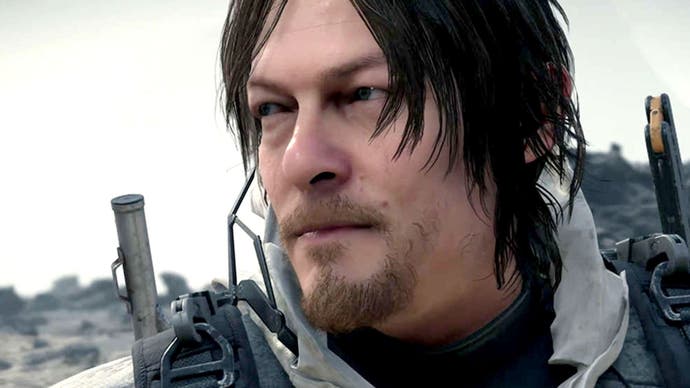What should we expect from Death Stranding on PC?
And how about PlayStation 5?
The first phase of the Death Stranding embargo has passed, reviews are out and we have some measure of the game, but the announcement of a PC version coming in the summer of 2020 has left us somewhat baffled. For starters, there's the timing - the news was announced prior to the release of the PlayStation 4 game, which makes little sense. Then there's the fact that 505 Games will be publishing, while the extent of its participation in the project remains unknown. But dwarfing that is the fact that Death Stranding is effectively a collaboration between Kojima Productions and Guerrilla Games - meaning that around 70 first-party Sony staff are contributing to a PC release, one way or another.
Not only that, but the basic existence of a PC port means that Guerrilla's Decima Engine is breaking free from the bounds of PlayStation hardware, which may present some challenges bearing in mind how closely wedded its architectural make-up is to PlayStation hardware. A specific case in point concerns the 30 frames per second frame-rate. There's a reason why Guerrilla never released an unlocked frame-rate mode for Horizon Zero Dawn on PlayStation 4 Pro: fundamentally, the engine is designed to operate at 30Hz - CPU resources in particular are designed to offer as smooth a 30fps experience as possible, to the point where spare CPU cycles are allocated to predictive world streaming. It's one of the reasons why a Decima open world doesn't have the hitching and stutter many other games have, but it's also a system that would likely need to be unpicked for a PC port.
Then there's the whole question of how much efficiency may be lost in porting the graphics side of the project away from the PlayStation platform. Terrifically optimised shaders should remain optimal on any modern PC GPU, but Guerrilla's code is designed to exploit the PS4 family of consoles specifically - and it'll be fascinating to see the extent to which bespoke optimisation for, say, PS4's asynchronous compute functions transfers across to PC. All of which makes us wonder which graphics API the port will use. Historically, Guerrilla has run a PC version of its engine for internal use only under OpenGL - but Vulkan would be the more logical choice, and certainly a closer match to PS4 development than DirectX 12.
A lot of the speculation surrounding the PC port rests on a brace of unknown variables: specifically, who is developing it, and how long has it been a part of the plan? If it's Kojima Productions itself at the helm, with a PC port always in the thoughts of the developer, we can assume that the team's collaboration with Guerrilla may encompass the conversion - in which case, we should be in pretty good shape. In a more concerning scenario at the very opposite, Death Stranding PC is latter-day addition that ends up being farmed out to an external developer. At this point, the process of porting across a game and an engine explicitly designed for consoles suddenly takes on a whole new dimension in terms of the scale of the challenge.
Looking at things more positively, we should consider that while the Decima Engine that powers Death Stranding has much in common with the technological foundation of Horizon Zero Dawn, it has also been subject to many enhancements (character realism and water rendering to name just two) and there's a strong possibility that many of the behind-the-scenes improvements were designed as much for Horizon 2 as they are for Death Stranding. And this raises the question of what Horizon 2 is and what platforms it may release on. A cross-platform PS4/PS5 launch is possible, as is the idea of making it a next-gen showcase for the new Sony console, meaning that scalability towards a more powerful architecture is baked in. And of course, a PS5 port of Death Stranding itself may well be part of the original plan too - though the notion of a preview of sorts being available for PC users months ahead of the new console's launch doesn't sound like a good thing from Sony's perspective.
So realistically, what should we expect from the PC version of the game? This can be split into 'stuff likely to happen' and 'stuff we'd really like to happen'. On the former point, the PC version of Red Dead Redemption 2 demonstrates that some aspects are relatively simple to scale up - volumetric resolution, shadow quality and draw distance are areas where we'd expect the developers to have easy access at the engine level. Unlocked frame-rate and arbitrary resolution support are, at this point, essential for a credible PC release - as is mouse/keyboard support and an optimised user interface for what is a very different platform.
In terms of upgrades we'd like to see, improvements to screen-space quality reflections would be welcome in addition to the above, but what would really be special would be the introduction of hardware-accelerated ray tracing support. Whether it's enhanced shadows, global illumination or reflections, the chance to see Kojima Productions/Guerrilla's work augmented with RT would be a mouthwatering prospect - all the better if, again, it would work a preview of sorts of what we would hope to see from Decima running on the PlayStation 5.
With all of that said, there is the very real possibility that we're projecting too much of our own optimism into the technical make-up of the Death Stranding PC port. The 'early summer' 2020 release date is months ahead of the arrival of PlayStation 5 - and it may well be the case that if a PS5 version is in development, Sony may wish for big, engine-level enhancements from Guerrilla Games to be held back for the new console. We do expect to see a lot of PS5 ports or cross-gen patches for the new console, and the inclusion of Death Stranding seems like a no-brainer. On the flip side, the summer release date may hint that no PS5 version is in development - after all, why punt an enhanced release to the public ahead of a next-gen console release? Meanwhile, the involvement of 505 Games as publisher may preclude any further input from Guerrilla in the PC port.
And in terms of new PC features, we have no visibility on potential Decima enhancements either - and we should remember that scalability is a two-way street, which raises a key question: bearing in mind the engine's PlayStation origins, what opportunities are there to scale the engine down for less capable PC hardware, beyond lowering resolution? Memory management, for example, may prove challenging for owners of older GPUs with more limited amounts of VRAM. At the very least though, it should be fascinating to compare native 4K Decima rendering with the PS4 Pro's excellent checkerboarding support.
On a related topic, the whole idea of Decima running on PC in a commercial environment raises an interesting question. For its current generation titles, Sony is committed to PlayStation Now for game streaming, but its announced plans for next-gen see the firm teaming up with Microsoft to deliver PlayStation 5 experiences via the cloud, and just how this will be delivered remains unknown. Would Sony really develop PS5-based cloud servers for mass deployment into Microsoft's datacentres? Or would it simply port its first-party titles to PC and use the existing infrastructure? If that's the case, Death Stranding could be fascinating to look at as an example of how well one of Sony's best first-party engines would run on PC.
Similar to Death Stranding itself, the PC port is an enigma, for now at least. There's a long time to wait until Summer 2020, so details on who's producing the conversion, what enhancements there may be - if any - and any indication of a relationship with a PlayStation 5 version is all shrouded in mystery, and there's no real hurry for either 505 or Kojima Productions to tell us any more for quite some time. And in fact, quite why the port was announced at all at this time remains equally as mysterious as the nature of the port. Hopefully further details will come to light soon.











